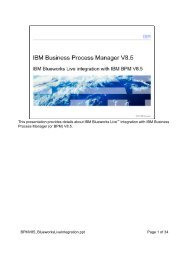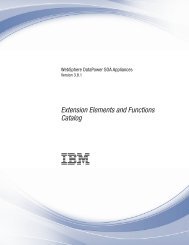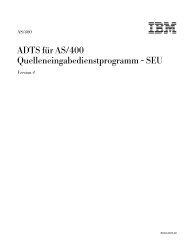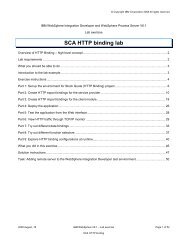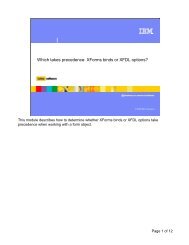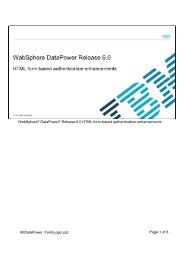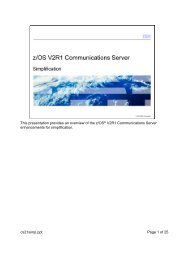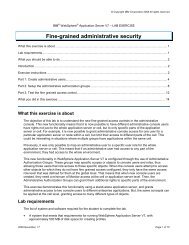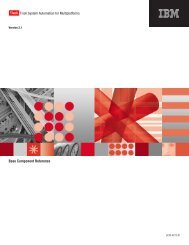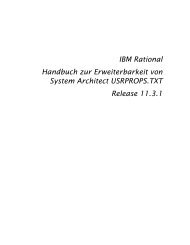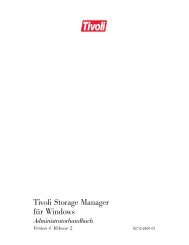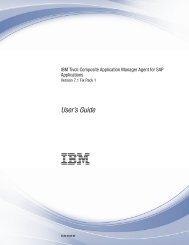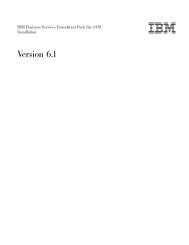- Page 1:
IBM Tivoli Access Manager for e-bus
- Page 4 and 5:
Note Before using this information
- Page 6 and 7:
Silent configuration overview . . .
- Page 8 and 9:
Event capturing and logging . . . .
- Page 10 and 11:
Token authentication concepts . . .
- Page 12 and 13:
Configuring WebSEAL key database pa
- Page 14 and 15:
Preserving cookie names . . . . . .
- Page 16 and 17:
Logging . . . . . . . . . . . . . .
- Page 18 and 19:
xvi IBM Tivoli Access Manager for e
- Page 20 and 21:
This chapter introduces you to impo
- Page 22 and 23:
Web security information v IBM Tivo
- Page 24 and 25:
v Secure Sockets Layer Introduction
- Page 26 and 27:
The following documents associated
- Page 28 and 29:
Monospace Code examples, command li
- Page 30 and 31:
IBM Tivoli Access Manager WebSEAL:
- Page 32 and 33:
The access control list (ACL) An ac
- Page 34 and 35:
Note: Traditional applications bund
- Page 36 and 37:
v Authenticated clients access usin
- Page 38 and 39:
v A user makes a request for a reso
- Page 40 and 41:
A unified Web space simplifies the
- Page 42 and 43:
14 IBM Tivoli Access Manager for e-
- Page 44 and 45:
Server instance configuration This
- Page 46 and 47:
Table 1. WebSEAL instances sharing
- Page 48 and 49:
- When the Web document root is not
- Page 50 and 51:
-ssl_yn ssl_enable_yes_no -key_file
- Page 52 and 53:
Server instance configuration tasks
- Page 54 and 55:
Removing a server instance To remov
- Page 56 and 57:
Communication protocol configuratio
- Page 58 and 59:
Restricting connections from specif
- Page 60 and 61:
Cryptographic hardware for encrypti
- Page 62 and 63:
You can specify whether to enable F
- Page 64 and 65:
3. In the Open dialog window, selec
- Page 66 and 67:
Quality of protection levels You ca
- Page 68 and 69:
Configuring authorization database
- Page 70 and 71:
3. Change the settings for the data
- Page 72 and 73:
Multi-locale support with UTF-8 Thi
- Page 74 and 75:
WebSEAL generates logging and audit
- Page 76 and 77:
Configuring multi-locale support Co
- Page 78 and 79:
WebSEAL does not recognize UTF-8 en
- Page 80 and 81:
ackwards compatibility, the format
- Page 82 and 83:
Language System Directory English (
- Page 84 and 85:
Preventing vulnerability caused by
- Page 86 and 87:
Replicated front-end WebSEAL server
- Page 88 and 89:
The session cookie links to session
- Page 90 and 91:
Table 4. P3P default header values
- Page 92 and 93:
Table 6. Supported values for the c
- Page 94 and 95:
For each value specified for purpos
- Page 96 and 97:
example, when your compact policy s
- Page 98 and 99:
70 IBM Tivoli Access Manager for e-
- Page 100 and 101:
Server tasks Start a WebSEAL server
- Page 102 and 103:
Managing the Web space The followin
- Page 104 and 105:
You can configure the specific grap
- Page 106 and 107:
Parameter Description cache-type Sp
- Page 108 and 109:
HTTP data compression WebSEAL serve
- Page 110 and 111:
Compression policy in POPs You can
- Page 112 and 113:
HTTP error message pages When WebSE
- Page 114 and 115:
Filename Title Description HTTP Err
- Page 116 and 117:
Managing custom account management
- Page 118 and 119:
Macro Description %CERTAUTHN% Subst
- Page 120 and 121:
Backup and restore Tivoli Access Ma
- Page 122 and 123:
Problem determination tools for Web
- Page 124 and 125:
Logging WebSEAL serviceability mess
- Page 126 and 127:
Event capturing and logging You can
- Page 128 and 129:
In this example, none of the option
- Page 130 and 131:
Authentication event log output Aut
- Page 132 and 133:
Table 18. Authentication errors (co
- Page 134 and 135:
Log Files Location Parameter Enable
- Page 136 and 137:
Displaying referer.log The referer.
- Page 138 and 139:
WebSEAL-specific ACL policies The f
- Page 140 and 141:
Configuring three strikes login pol
- Page 142 and 143:
Configuring password strength polic
- Page 144 and 145:
Specific user and global settings T
- Page 146 and 147:
v token authentication v certificat
- Page 148 and 149:
The entry level = unauthenticated m
- Page 150 and 151:
Table 20. Example integer values fo
- Page 152 and 153:
pdadmin> pop modify test set ipauth
- Page 154 and 155:
Quality of protection POP policy Th
- Page 156 and 157:
128 IBM Tivoli Access Manager for e
- Page 158 and 159:
Overview of the authentication proc
- Page 160 and 161:
Managing session state A secure con
- Page 162 and 163:
This value corresponds to the numbe
- Page 164 and 165:
eauthenticating the user. WebSEAL u
- Page 166 and 167:
v Because the cookies are available
- Page 168 and 169:
Authentication configuration overvi
- Page 170 and 171:
Configuring multiple authentication
- Page 172 and 173:
3. When the client makes an additio
- Page 174 and 175:
You can configure the username and
- Page 176 and 177:
Configuration conditions If forms a
- Page 178 and 179:
If the security policy does require
- Page 180 and 181:
Setting Description accept-client-c
- Page 182 and 183:
Thus, the default value for cert-ca
- Page 184 and 185:
HTTP header authentication Tivoli A
- Page 186 and 187:
See also: v “Authentication metho
- Page 188 and 189:
Token authentication Tivoli Access
- Page 190 and 191:
2. WebSEAL returns an authenticatio
- Page 192 and 193:
4. Restart the WebSEAL server. See
- Page 194 and 195:
Failover authentication This sectio
- Page 196 and 197:
authenticates using forms authentic
- Page 198 and 199:
Administrators can configure WebSEA
- Page 200 and 201:
cookie. By using the cookie, the We
- Page 202 and 203:
Specify the protocol for failover c
- Page 204 and 205:
Backwards compatibility WebSEAL ser
- Page 206 and 207:
[failover-add-attributes] attribute
- Page 208 and 209:
v When this value is no, and the se
- Page 210 and 211:
SPNEGO protocol and Kerberos authen
- Page 212 and 213:
v The client cannot use an SSL sess
- Page 214 and 215:
186 IBM Tivoli Access Manager for e
- Page 216 and 217:
Switch user authentication The WebS
- Page 218 and 219:
9. The administrator ends the switc
- Page 220 and 221:
supported mechanism, an additional
- Page 222 and 223:
The authentication method parameter
- Page 224 and 225:
The default file name is switchuser
- Page 226 and 227:
xauthn_username xauthn_qop xauthn_i
- Page 228 and 229:
Server-side request caching This se
- Page 230 and 231:
v “Modifying request-body-max-rea
- Page 232 and 233:
Configuring reauthentication based
- Page 234 and 235:
Extending the session cache entry l
- Page 236 and 237:
Configuring reauthentication based
- Page 238 and 239:
Extending the session cache entry l
- Page 240 and 241:
Automatic redirection during user l
- Page 242 and 243:
Configuring post password change pr
- Page 244 and 245:
WebSEAL provides an external authen
- Page 246 and 247:
credattrs_email joeuser@bigco.com c
- Page 248 and 249:
Credential refresh This section con
- Page 250 and 251:
The default lifetime of data in the
- Page 252 and 253:
Credential refresh configuration To
- Page 254 and 255:
efresh can succeed. Likewise, when
- Page 256 and 257:
Managing client-side and server-sid
- Page 258 and 259:
At installation, WebSEAL uses the s
- Page 260 and 261:
Setting the maximum number of cache
- Page 262 and 263:
Windows desktop single sign-on This
- Page 264 and 265:
v Failover authentication The failo
- Page 266 and 267:
Each WebSEAL instance must have a s
- Page 268 and 269:
highly secure password, such as a r
- Page 270 and 271:
Note: The location of the kinit uti
- Page 272 and 273: v When a problem occurs, consider e
- Page 274 and 275: The link contains a special CDSSO m
- Page 276 and 277: 2. Edit /etc/nsswitch.conf so the h
- Page 278 and 279: [authentication-mechanisms] sso-cre
- Page 280 and 281: http://websealB/resource.html?PD-ID
- Page 282 and 283: Each entry in the WebSEAL is assign
- Page 284 and 285: e-community single sign-on E-commun
- Page 286 and 287: A user who fails authentication wit
- Page 288 and 289: 4. After successful login, the MAS
- Page 290 and 291: v The domain-specific cookie contai
- Page 292 and 293: owser is Microsoft Internet Explore
- Page 294 and 295: 1. Enabling and disabling e-communi
- Page 296 and 297: [e-community-domain-keys] dA.com =
- Page 298 and 299: For example: [e-community-sso] vf-u
- Page 300 and 301: [server] pre-510-compatible-tokens
- Page 302 and 303: [ecsso-incoming-attributes] my_spec
- Page 304 and 305: WebSEAL junctions overview You can
- Page 306 and 307: Managing junctions with Web Portal
- Page 308 and 309: Configuring a basic WebSEAL junctio
- Page 310 and 311: Mutually authenticated SSL junction
- Page 312 and 313: v It is highly recommended that you
- Page 314 and 315: WebSEAL-to-WebSEAL junctions over S
- Page 316 and 317: v “Processing URLs in requests”
- Page 318 and 319: Modifying absolute URLs with script
- Page 320 and 321: To solve this problem: 1. Always wr
- Page 324 and 325: Part 2: -j junctions modify Set-Coo
- Page 326 and 327: Supplying client identity in HTTP h
- Page 328 and 329: [junction] max-webseal-header-size
- Page 330 and 331: ack-end server UUID to each front-e
- Page 332 and 333: v Back-end server 2 is called APP2
- Page 334 and 335: lcp_uri URI encoded local code page
- Page 336 and 337: v Do not mark any certificate in th
- Page 338 and 339: 1. Copy query_contents.sh into a fu
- Page 340 and 341: Typical output looks like: 100 inde
- Page 342 and 343: 314 IBM Tivoli Access Manager for e
- Page 344 and 345: Configuring BA headers for single s
- Page 346 and 347: Forwarding original client BA heade
- Page 348 and 349: Using global sign-on (GSO) Tivoli A
- Page 350 and 351: Configuring a GSO-enabled WebSEAL j
- Page 352 and 353: Configuring single sign-on to IBM W
- Page 354 and 355: Configuring single sign-on forms au
- Page 356 and 357: WebSEAL parses the HTML page to ide
- Page 358 and 359: [loginpage1] login-page = /cgi-bin/
- Page 360 and 361: It is not necessary to specify hidd
- Page 362 and 363: 334 IBM Tivoli Access Manager for e
- Page 364 and 365: Supporting CGI programming To suppo
- Page 366 and 367: Supporting back-end server-side app
- Page 368 and 369: v Short name of the server v IP add
- Page 370 and 371: pdadmin> objectspace create /Resour
- Page 372 and 373:
A single user that logs in multiple
- Page 374 and 375:
346 IBM automatically with no user
- Page 376 and 377:
Note: If you use Web Portal Manager
- Page 378 and 379:
Object Space Entry URL Template /ow
- Page 380 and 381:
The following sample dynurl.conf fi
- Page 382 and 383:
The security policy To provide suit
- Page 384 and 385:
356 IBM Tivoli Access Manager for e
- Page 386 and 387:
Overview of ADI retrieval The Tivol
- Page 388 and 389:
The resource-manager-provided-adi p
- Page 390 and 391:
Retrieving ADI from the user creden
- Page 392 and 393:
Dynamic ADI retrieval Rules can be
- Page 394 and 395:
366 IBM Tivoli Access Manager for e
- Page 396 and 397:
Basic configuration Basic configura
- Page 398 and 399:
trace_verbose_get_entitlement If se
- Page 400 and 401:
Erandt_Securtities_Entitlements e
- Page 402 and 403:
http://ese.erant.com/attributes 1 U
- Page 404 and 405:
376 IBM v v /opt/pdwebars/protocol_
- Page 406 and 407:
Windows C:\Program Files\Tivoli\PDW
- Page 408 and 409:
including tracking CGI types, compi
- Page 410 and 411:
Stanza organization The remainder o
- Page 412 and 413:
Server configuration v [server] v [
- Page 414 and 415:
HTTP/1.1 connection timeout, in sec
- Page 416 and 417:
Location of the file that contains
- Page 418 and 419:
Enable or disable support for UTF-8
- Page 420 and 421:
Specifies how WebSEAL responds to r
- Page 422 and 423:
Host name of the LDAP server. The W
- Page 424 and 425:
cache-group-expire-time = number_of
- Page 426 and 427:
String that specifies the key label
- Page 428 and 429:
Active Directory [uraf-ad] stanza a
- Page 430 and 431:
ind-pwd = admin_password Encoded ad
- Page 432 and 433:
LDAP port number for the Lotus Domi
- Page 434 and 435:
Secure Socket Layer [ssl] stanza we
- Page 436 and 437:
Disables support for SSL Version 2.
- Page 438 and 439:
Port number for communication with
- Page 440 and 441:
Indicates whether automatic refresh
- Page 442 and 443:
Authentication methods [ba] stanza
- Page 444 and 445:
Specifies how to handle certificate
- Page 446 and 447:
Step-up authentication levels. WebS
- Page 448 and 449:
Fully qualified path for a library
- Page 450 and 451:
failover-certificate = fully_qualif
- Page 452 and 453:
Authentication failover v [failover
- Page 454 and 455:
List of attributes from the origina
- Page 456 and 457:
Cross-domain single sign-on v [cdss
- Page 458 and 459:
attribute_pattern = {preserve|refre
- Page 460 and 461:
Integer value specifying the port n
- Page 462 and 463:
File names for keys for any domains
- Page 464 and 465:
List of string values to specify th
- Page 466 and 467:
Integer value for lifetime, in seco
- Page 468 and 469:
Content This section contains the f
- Page 470 and 471:
Specifies how standard WebSEAL HTML
- Page 472 and 473:
Page containing a change password f
- Page 474 and 475:
Automatic redirect v [acnt-mgt] v [
- Page 476 and 477:
List containing system environment
- Page 478 and 479:
Relative path name to a graphics fi
- Page 480 and 481:
Content compression v [compress-mim
- Page 482 and 483:
Content encodings [content-encoding
- Page 484 and 485:
Junction management [junction] stan
- Page 486 and 487:
Positive integer value indicating t
- Page 488 and 489:
Document filtering [filter-url] sta
- Page 490 and 491:
Scheme filtering [filter-schemes] s
- Page 492 and 493:
Script filtering v [script-filterin
- Page 494 and 495:
Credential refresh [credential-refr
- Page 496 and 497:
Integer value that specifies the ti
- Page 498 and 499:
Integer value that specifies the ti
- Page 500 and 501:
Enables or disables the requests lo
- Page 502 and 503:
Auditing [aznapi-configuration] sta
- Page 504 and 505:
Specifies event logging for the spe
- Page 506 and 507:
The maximum size of the in-memory p
- Page 508 and 509:
Policy server v [policy-director] v
- Page 510 and 511:
Specifies the type of access the us
- Page 512 and 513:
v state Mechanisms for maintaining
- Page 514 and 515:
Specifies the purpose of the inform
- Page 516 and 517:
Specifies the recipients of the inf
- Page 518 and 519:
490 IBM Tivoli Access Manager for e
- Page 520 and 521:
For example, if the configured name
- Page 522 and 523:
-p port TCP port of the back-end th
- Page 524 and 525:
496 IBM Tivoli Access Manager for e
- Page 526 and 527:
IBM may use or distribute any of th
- Page 528 and 529:
500 IBM Tivoli Access Manager for e
- Page 530 and 531:
asic authentication configuring 145
- Page 532 and 533:
F failover authentication configura
- Page 534 and 535:
key management (continued) managing
- Page 536 and 537:
eauthentication (continued) based o
- Page 538:
User Registry Adapter Framework (UR



